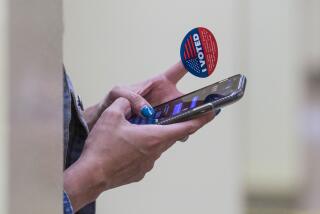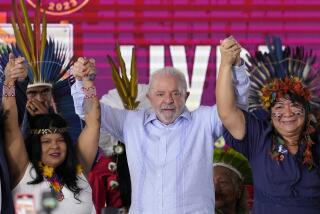A Democratic Iraq?
WASHINGTON — The world will not soon forget the images of Iraqis dancing on the fallen statue of Saddam Hussein in the center of Baghdad. In what was a surprise only to those who don’t understand the nature of man, a global audience witnessed the enduring power of the aspiration for freedom.
With the liberation of the Iraqi people virtually complete, opponents of war are shifting their sights. They now claim that democracy will not work in Iraq. Iraq’s political history, they say, is one of a succession of military coups and dictatorships. The country simply has no democratic tradition. Furthermore, Iraq’s ethnic and sectarian rivalries are more likely to produce violence and social chaos than political pluralism. Finally, they say democracy cannot be imposed by military power. Thus, coalition forces are not liberators but foreign occupiers.
There should be no illusions. Building a democratic Iraq will be difficult. It will take time. It will be imperfect. And the outcome is not guaranteed. The effort will lead to more “instability” -- to the extent that Hussein’s “stable” order is gone forever. Nevertheless, democracy in Iraq is possible, and this possibility is both morally and strategically necessary to pursue.
Democracy has flourished in countries with a wide variety of ethnic, religious and historical experiences. In 1945, Japan had virtually no democratic tradition. Its recent history was one of fanatical militarism and airborne suicide bombers. At the end of World War II, Germans remembered the Weimar Republic as a time of hyperinflation, desperate poverty and national insecurity, which fueled the Nazi rise to power. Yet, Allied military occupation of West Germany and Japan in the postwar years gave birth to democracy in both countries -- despite the advice of regional “experts” who maintained it couldn’t be done.
Are the challenges facing liberated Iraqis today more daunting than those confronting Albanians in 1991, after four decades of a xenophobic tyranny that broke with Josef Stalin and Mao Tse-tung because they were too moderate? In the 1980s, did El Salvadorans battling both a vicious old guard and a brutal communist insurgency have a better chance of establishing democracy than the Iraqis today? Were the hurdles overcome by South Koreans and Taiwanese to transform their poor, agrarian societies into dynamic democracies, while fending off implacably hostile neighbors, that much higher?
The democracy skeptics use the specter of ethnic and sectarian violence to claim that a free and open Iraq is impossible. But recall the predictions that majority rule in South Africa would lead to tribal warfare. For decades, violence in Iraq was political, carried out in the name of a totalitarian ideology descended from 1930s national socialism. Hussein gassed Kurds, executed tribal Sunnis and slaughtered Iraqi Shiites to stifle dissent against his Baath Party dictatorship. It is the remnants of the Baath Party cancer, not Iraq’s ethnic and sectarian diversity, that pose the greatest obstacle to democracy.
As for Iraq’s lack of a democratic tradition, it may not be as complete as some claim. In the 1950s, Iraq’s government was a constitutional monarchy, with a parliament that exercised independent political power. More significant, a major portion of Iraq has adopted political pluralism in the last 10 years. Under the protection of U.S. and British air power in the northern no-fly zone, the Kurds have developed self-governing institutions there. What Iraq’s Kurds have achieved, Iraq’s Sunnis, Shiites, Turkmens, Assyrians and Chaldeans -- with their Kurdish countrymen -- can also achieve, now that Hussein’s regime is on the ash heap of history.
Iraq’s greatest resource is not oil; it is its people. Iraq is not a failed nation like Afghanistan or Somalia. Iraqis are well educated, energetic and ambitious. Although the majority of the greater Middle East disenfranchises 50% of its population, women in Iraq are educated and in the workplace. Iraqi exiles can also help restore Iraq to its former luster. A perverse idea has taken hold that Iraqis able to flee Hussein’s tyranny should be automatically disqualified from playing any role in the new Iraq, even if they spent years fighting for their country’s liberation. Judging from their reactions so far, Iraqis don’t accept such an absurdity.
There is an insidious subtext in the debate over whether democracy can grow and flourish in Iraq. Even though a democratic Iraq may be feasible, goes the argument, it is not desirable. This view has adherents in the U.S. State Department and among some foreign-policy elites, in Middle Eastern studies departments of major universities and in Arab capitals. For Arab rulers, the reason is obvious: Democracy in Cairo, Damascus or Riyadh would mean statues tumbling there.
But for some Americans, fear of a democratic Iraq may reflect a larger worldview. Last week, former national security advisor Brent Scowcroft summed it up. Holding up the possibility of anti-American religious radicals winning an election in Iraq, he said, “We’re surely not going to let them take over.” It is this apparent distrust of the people, this implicit preference for order over freedom, that led Scowcroft to urge that the U.S. stand aside at the end of the 1991 Persian Gulf War, when Hussein slaughtered rebellious Iraqi Shiites. Apparently, Scowcroft had greater faith in the Chinese leaders, whom he toasted in Beijing shortly after they murdered protesters in Tiananmen Square who were carrying a model of the Statue of Liberty.
There is no evidence that elections in Iraq would empower anti-American radicals. Yes, elections would increase the political representation of Iraq’s long-repressed Shiite majority -- and that would surely make life uncomfortable for Saudi despots who have good reason to fear democracy with a Shiite accent. But Shiism is not reflexively anti-American. Witness the fatwa issued by Grand Ayatollah Ali Sistani calling on Iraqis not to interfere with coalition forces in southern Iraq.
It is the Scowcrofts of the world who have led many Arab reformers to question the U.S. commitment to a democratic Iraq, not because of the challenge it poses but because America prefers the “stability” of authoritarians. Yet, it is the status quo in the Middle East that is unstable. As long as the U.S. is allied with Arab authoritarians who deflect popular anger toward external enemies to preserve their corrupt rule, as long as young Arabs have no peaceful channels to express dissent, the status quo will breed Islamo- fascist terrorism, anti-Americanism and instability.
America has supported regime change and democratic movements in Latin America, Asia, Europe and Africa, and the world is a better place -- not one in which we always get our way. The democratic Philippines closed U.S. military bases. Democratic Turkey refused to be a staging base for U.S. ground forces in the war against Iraq. Democratic Chile didn’t support us in the U.N. Security Council debate over the use of force against Hussein. Democracy doesn’t guarantee an outcome. But that is no reason to go back to Ferdinand Marcos or Gen. Augusto Pinochet.
In liberating the Iraqi people, America and its allies have made it clear to the world that we no longer prefer dictators and their pseudo- stability. We have demonstrated that the liberation of Iraq was indeed a noble mission. We can proudly say the Middle East exemption from democratic change has ended.
More to Read
Sign up for Essential California
The most important California stories and recommendations in your inbox every morning.
You may occasionally receive promotional content from the Los Angeles Times.










